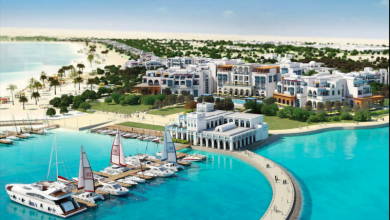Ramadan in Qatar 2024: Exploring Time-Honored Traditions, Customs, and Culture

Introduction:
Ramadan in Qatar holds a special place in the hearts of its people, marking a time of spiritual reflection, community bonding, and cultural richness. As the holiest month in Islam, Ramadan carries profound significance and is observed with enthusiasm and dedication by Muslims across the globe. In this blog, we delve into the intricate tapestry of Ramadan in Qatar, exploring its time-honored traditions, customs, and the vibrant cultural landscape that characterizes this sacred period in 2024.
The Tradition of Fasting:
At the core of Ramadan lies the tradition of fasting, where Muslims abstain from best food restaurants and drink, and other physical needs from dawn till dusk. In Qatar, this act of self-discipline is observed with great devotion, serving as a spiritual purification process. Fasting not only instills a sense of empathy for the less fortunate but also fosters self-control and mindfulness. The fast is broken each evening with the ‘iftar’ meal, a momentous occasion marked by communal gatherings and the sharing of blessings.
Alongside fasting, prayers play a central role during Ramadan in Qatar. Muslims engage in additional prayers, such as the Taraweeh, which are performed each night throughout the month. Mosques across Qatar resonate with the melodious recitation of the Quran, creating an ambiance of tranquility and devotion. This spiritual reflection extends beyond formal prayers, with individuals dedicating time for personal introspection, seeking forgiveness, and striving for spiritual renewal.
Ramadan in Qatar 2024 –
| Content | Topic |
| Introduction to Ramadan | Ramadan is the ninth month of the Islamic lunar calendar, observed by Muslims worldwide as a month of fasting, prayer, reflection, and community. |
| Significance of Fasting | Fasting during Ramadan is one of the Five Pillars of Islam and serves as a spiritual practice aimed at self-discipline, empathy for the less fortunate, and closeness to God. |
| Preparing for Ramadan | Tips for preparing both mentally and physically for the month of fasting, including adjusting sleep schedules, planning meals, and setting spiritual goals. |
| Daily Routine during Ramadan | A typical daily schedule for Muslims during Ramadan, including suhoor (pre-dawn meal), fasting hours, prayers, work, and iftar (breaking fast) gatherings. |
| Spiritual Reflection | The importance of introspection, self-improvement, and increased acts of worship during Ramadan, such as reading the Quran, giving to charity, and seeking forgiveness. |
| Community and Charity | Emphasizing the communal aspect of Ramadan, including the significance of sharing meals with family and friends, attending taraweeh prayers at the mosque, and engaging in acts of charity and goodwill. |
| Eid al-Fitr Celebration | Exploring the joyous celebration that marks the end of Ramadan, including communal prayers, feasting, exchanging gifts, and giving to those in need. |
| Conclusion | Ramadan is a sacred and transformative time for Muslims worldwide, fostering spiritual growth, community solidarity, and acts of compassion and generosity. |
Iftar gatherings encompass Hospitality & Cultural Festivities, Celebrations.
One of the hallmark customs of Ramadan in Qatar is the cherished tradition of iftar gatherings. Families, friends, and neighbors come together to break their fast, sharing a spread of traditional delicacies and refreshing beverages. The spirit of hospitality thrives during Ramadan, as Qatari households open their doors to guests, irrespective of background or beliefs. These iftar gatherings foster bonds of kinship and solidarity, embodying the essence of community spirit.
Beyond its religious significance, Ramadan in Qatar is also a celebration of culture and heritage. The streets come alive with vibrant decorations, festive lights, and bustling markets, creating a captivating ambiance. Traditional music performances, cultural exhibitions, and culinary festivals add to the festive atmosphere, offering a glimpse into Qatar’s rich cultural tapestry. Through these festivities, the diverse mosaic of Qatari identity shines brightly, celebrating unity amidst diversity.
The Spirit of Charity and Giving:
Ramadan in Qatar is synonymous with acts of charity and compassion towards the less fortunate. Individuals and organizations embark on various initiatives to support those in need, including food drives, distribution of Ramadan baskets, and sponsorship of iftar meals. The spirit of giving extends beyond material donations, encompassing acts of kindness, empathy, and goodwill towards fellow human beings. These charitable endeavors embody the true essence of Ramadan, exemplifying the values of compassion and social responsibility.
What is the History of Ramadan?
Ramadan is the ninth month of the Islamic lunar calendar and holds significant spiritual importance for Muslims. It commemorates the revelation of the Quran to Prophet Muhammad in 610 CE. During Ramadan, Muslims fast from dawn until sunset, engaging in increased prayer, reflection, and acts of charity. The month culminates in the celebration of Eid al-Fitr. It serves as a time of spiritual growth, community bonding, and devotion to God for Muslims worldwide.
Amidst the modernity of Qatar’s rapidly evolving landscape, Ramadan serves as a poignant reminder of the nation’s rich heritage and cultural identity. Traditional practices and customs passed down through generations are revered and upheld during this sacred month. From the preparation of age-old recipes to the recitation of ancient prayers, Ramadan serves as a testament to the enduring legacy of Qatari culture. It reinforces the importance of preserving heritage amidst the winds of change, fostering a sense of pride and belonging among the people of Qatar.
How long does Ramadan endure?
Ramadan lasts 29 to 30 days, depending on the sighting of the moon. This lunar cycle not only heralds the culmination of Ramadan, celebrated with Eid al-Fitr, but also marks the inception of the month of Shawwal.
Since Islamic months adhere to the lunar calendar, Ramadan progresses roughly ten days earlier on the Gregorian calendar each year, for instance, Ramadan commenced on March 23 last year, whereas this year, it initiated on Monday, March 11.
In Qatar, Eid al-Fitr is anticipated to commence on Wednesday, April 10, signifying the culmination of Ramadan’s fasting period.
What are the Timings for Suhoor and Iftar in Qatar?
Suhoor refers to the pre-dawn meal consumed before fasting begins, while Iftar marks the breaking of the fast at sunset. These meals align with the times of sunrise and sunset, as well as with the Fajr (dawn) and Maghrib (sunset) prayers.
| Meal | Time | Description |
| Suhoor (Pre-dawn) | Before Fajr Adhan | The pre-dawn meal is consumed before the Fajr (dawn) prayer, typically eaten just before sunrise. |
| Fasting Hours | From Fajr to Maghrib | Muslims abstain from food, drink, smoking, and other physical needs from dawn (Fajr) until sunset (Maghrib). |
| Iftar (Breaking Fast) | At Maghrib Adhan | The evening meal to break the fast, immediately following the Maghrib (sunset) prayer. |
| Dinner | After Iftar | A larger meal often consumed after breaking the fast, usually consisting of multiple courses and shared with family and friends. |
What are the prayer times during Ramadan?
Islam mandates five obligatory prayers to be performed throughout the day: Fajr, Dhuhr, Asr, Maghrib, and Isha. The timing of these prayers varies according to the Islamic calendar.
During the Holy Month of Ramadan, an extra prayer called Taraweeh is observed after Isha. It is typically performed collectively at mosques within various communities.
Conclusion:
In conclusion, Ramadan in Qatar in 2024 is a time of profound significance, blending religious devotion with cultural celebration and community solidarity. The timeless traditions and customs observed during this sacred month serve as a beacon of spiritual enlightenment and cultural heritage. Through fasting, prayers, iftar gatherings, and acts of charity, Ramadan fosters a sense of unity, compassion, and shared humanity among the people of Qatar. As the nation continues to progress and evolve, Ramadan remains a steadfast reminder of the values that unite its people and enrich its cultural tapestry. As we bid farewell to another Ramadan, let us carry forward its lessons of compassion, generosity, and spiritual reflection, ensuring that its spirit continues to illuminate our lives throughout the year.






